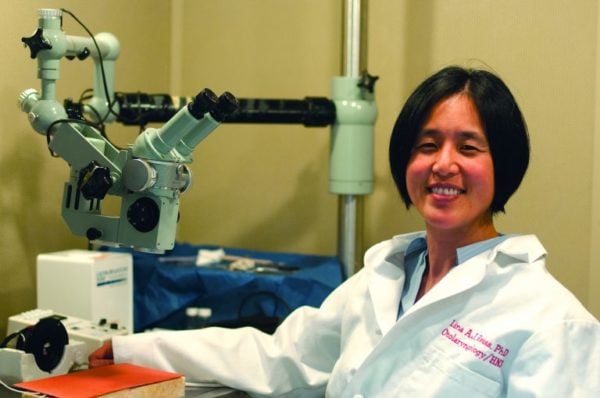Sounds of Progress

Lina Reiss’ research could one day help her hear voices better amid background noise.
Reiss, PhD ’05, was believed to be the first prelingually deaf person to earn a doctorate in biomedical engineering at Johns Hopkins. She’s now associate professor of otolaryngology and head and neck surgery and of biomedical engineering at Oregon Health & Science University. Reiss wears hearing aids, and this interview was conducted using a captioning telephone.
Reiss is pursuing two avenues of research. One could lead to a better hybrid cochlear implant, and the other would help people with hearing loss interpret the sounds they can hear.
Cochlear implants were first introduced in 1978 for people who are completely deaf. The electronic medical implants do the work of the damaged parts of the inner ear by providing sound signals to the brain. Hybrid cochlear implants, introduced in 1999, expand the use of cochlear implants beyond people who are completely deaf to those who have partially usable hearing. One problem, says Reiss, is that cochlear implant surgery sometimes damages the hearing that remains.
Through animal studies, Reiss and her colleagues are discovering that the hybrid implants don’t damage the hair cells, as previously assumed, but instead impair an inner-ear structure called the stria vascularis, which delivers energy needed to “power” the hair cells. “If we can understand how this is damaged, we can improve hearing preservation for this hybrid implant,” says Reiss.
She’s also learning how people with hearing loss interpret sounds. “A person with normal hearing would be able to tell the difference between a man’s voice heard simultaneously in one ear with a woman’s voice in the other ear, but people with abnormal hearing might combine them as one sound,” she explains. This could explain why people with hearing loss have more trouble separating out the voices around them in a noisy room. Solutions might involve a different combination of devices, such as the hybrid cochlear implant, as well as training the brain to process sounds more effectively, says Reiss.
